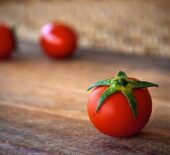The power of your gut microbiome in influencing your overall health is phenomenal. What your gut microbiota is made of can heavily impact almost every organ in your body as well as influencing how you metabolise food, your immune system function, an overall wellness. New research suggests that the food or prebiotics that feed the health promoting microbes in your gut may help you to lose weight.
The health promoting microbes in body need fuel to stay alive. These come from prebiotics. Prebiotics are mostly a form of indigestible substances which are commonly a type of fibre but also can be found in polyphenols. When the health promoting microbes in your body digest this fuel, they release chemical messages in the form of short chain fatty acids. These influence the functions of many parts of your body including your brain.
There are numerous strategies to help you to achieve and maintain a healthy weight but ensuring that you are feeding the health promoting microbes a rich diet of prebiotics could be the missing link. When you eat a calorie rich meal the reward centres in your brain are heightened, this is one of the reasons why losing weight can be difficult.
New research proposes that by including a diet which contains a good number of prebiotics, this could dampen the reward response of the brain to calorie rich foods. The researchers chose 59 middle aged, overweight men who follow a typical Western diet. Each man took 30g of the prebiotic fibre inulin each day for two weeks duration.
Four MRI scans were conducted. Firstly, before starting the prebiotic supplement, secondly, after taking the prebiotic supplement then repeated when a placebo supplement was taken without any prebiotics.
The researchers showed the participants images of different food dishes and asked the participants how much they wanted to consume each meal. Then afterwards, the researchers gave the participants the meal they wanted the most.
When the participants had the prebiotic supplement, they rated the high calorie meals lower and showed lower amounts of signalling in the reward centre of the brain. This was also linked to a change in the types of microbes found in the gut which became composed of more health promoting microbes.
Before you head to the supermarket to buy an inulin supplement, a whole diet approach is recommended. Including 25-38g of dietary fibre each day, the recommended amount for an adult is the best approach. It is not only important to get enough but a variety of plant based foods to meet this fibre needs. Each plant based food gives your health promoting microbes a different variety of prebiotics. Each prebiotic feeds a different variety of microbes and it is important not only to have health promoting microbes in your body but an optimal balance of different types.
Foods which are a good source of prebiotics include fruits, vegetables, wholegrains, nuts, seeds, legumes, and beans. Aim to make each three quarters or more from plant based foods and each snack half and you will be well on your way to achieving your dietary fibre goals for the day. Omega-3 fat, found in good amounts in seafood also has a prebiotic effect. Including one hundred grams of seafood three to four times a week is recommended for many health reasons and to add to the list it may support a healthy weight and weight loss.
Take home message: If you are trying to lose weight, put the odd back on your favour by reducing the heightened reward sensations experienced with calorie rich foods. Keeping an optimal gut microbiome could be the key to making your weight loss goals achievable and sustainable.
References:
- Davani-Davari D, Negahdaripour M, Karimzadeh I, Seifan M, Mohkam M, Masoumi SJ, Berenjian A, Ghasemi Y. Prebiotics: Definition, Types, Sources, Mechanisms, and Clinical Applications. Foods. 2019 Mar 9;8(3):92. doi: 10.3390/foods8030092. PMID: 30857316; PMCID: PMC6463098.
- Medawar E, Beyer F, Thieleking R, Haange SB, Rolle-Kampczyk U, Reinicke M, Chakaroun R, von Bergen M, Stumvoll M, Villringer A, Witte AV. Prebiotic diet changes neural correlates of food decision-making in overweight adults: a randomised controlled within-subject cross-over trial. Gut. 2023 Oct 4:gutjnl-2023-330365. doi: 10.1136/gutjnl-2023-330365. Epub ahead of print. PMID: 37793780.
- Vijay A, Astbury S, Le Roy C, Spector TD, Valdes AM. The prebiotic effects of omega-3 fatty acid supplementation: A six-week randomised intervention trial. Gut Microbes. 2021 Jan-Dec;13(1):1-11. doi: 10.1080/19490976.2020.1863133. PMID: 33382352; PMCID: PMC7781624.








